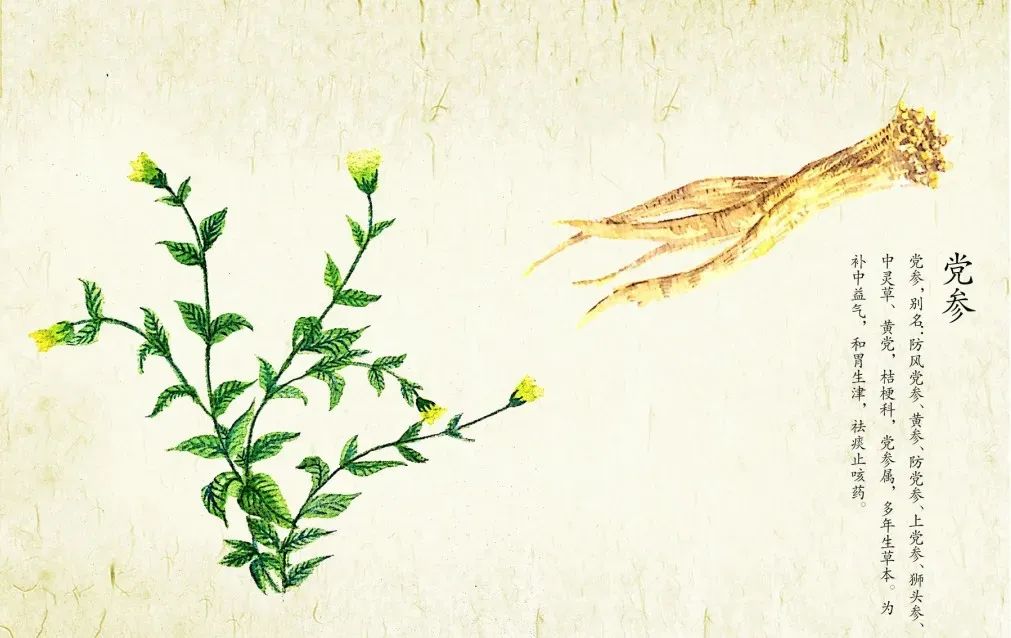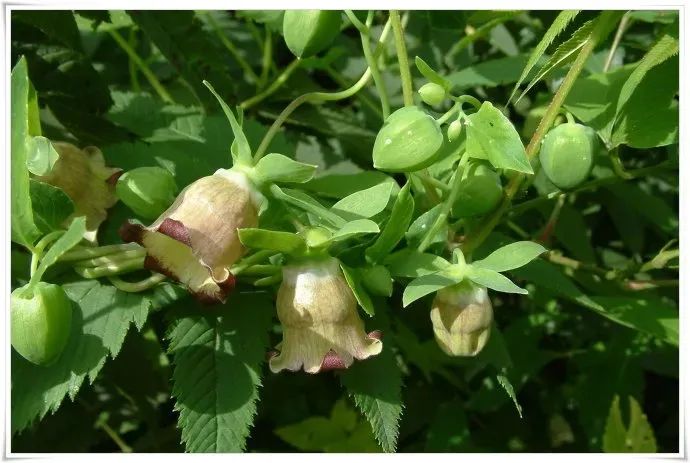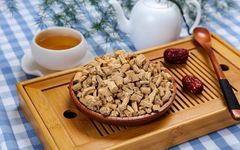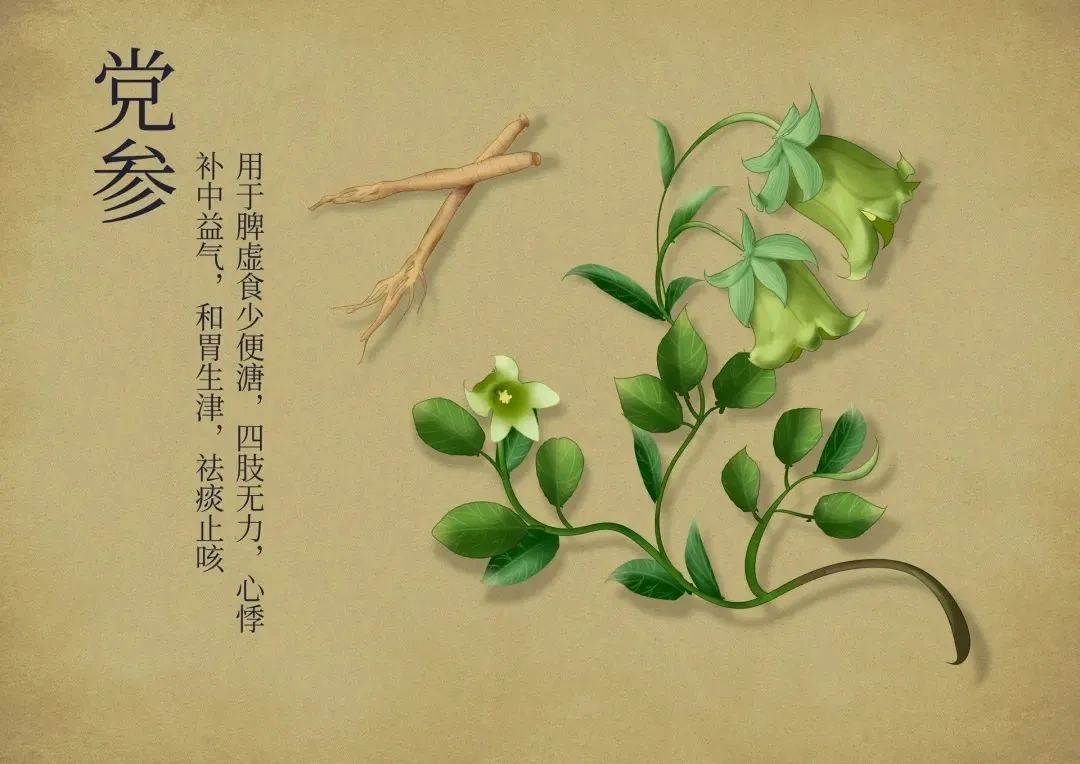
Effects and Functions of Dang Shen
Dang Shen (Codonopsis pilosula) is the dried root of the plant belonging to the Campanulaceae family. It has a sweet taste, a neutral nature, and is associated with the Spleen and Lung meridians. It possesses the functions of tonifying the middle and benefiting Qi, strengthening the Spleen and benefiting the Lungs, and generating fluids.1. Tonifying the Middle and Benefiting Qi: Dang Shen has a sweet taste and neutral nature, making it suitable for those with Qi deficiency. It is commonly used clinically to treat symptoms such as shortness of breath, palpitations, deficiency of Qi and blood, fatigue, and prolapse of the rectum.2. Strengthening the Spleen and Benefiting the Lungs: Dang Shen enters the Spleen and Lung meridians, effectively alleviating symptoms of Spleen and Lung deficiency, such as poor appetite, loose stools, and weak cough. It is often cooked together with Sha Shen (Glehnia littoralis) and Longan (Dimocarpus longan).3. Generating Fluids: Dang Shen has a certain effect in generating fluids and quenching thirst, making it useful for treating internal heat and thirst. It can also improve symptoms such as shortness of breath, thirst, dry throat, and vexation caused by excessive talking that depletes Qi and fluids.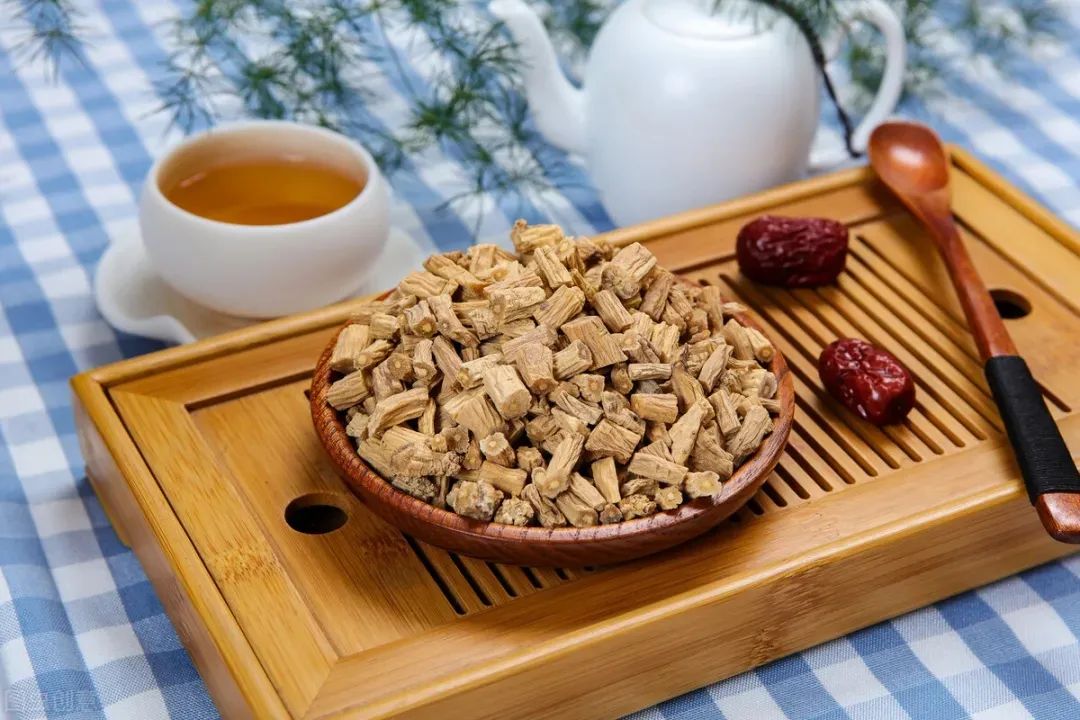 Main Functions and Indications
Main Functions and Indications
1. Poor appetite, vomiting, and diarrhea due to Spleen Qi deficiency;
2. Shortness of breath and spontaneous sweating due to Lung Qi deficiency;
3. Shortness of breath and thirst due to damage to both Qi and fluids;
4. Dizziness, palpitations, and pallor due to blood deficiency.
 Eight Major Effects
Eight Major Effects
1. Tonifying Lung Qi:
Dang Shen can relieve phlegm and cough, used for insufficient Lung Qi, low voice, shortness of breath upon exertion, or deficiency of both Lung and Kidney, leading to shortness of breath and cough.
2. Nourishing Blood and Benefiting Qi: Dang Shen has the effect of tonifying Qi and generating blood, suitable for treating deficiency of both Qi and blood, with symptoms such as shortness of breath, palpitations, fatigue, pale complexion, and dizziness.
3. Enhancing Physical Strength: Dang Shen and its polysaccharides can increase the number of macrophages, enlarge cell volume, and enhance phagocytic function, thereby improving the body’s immunity and reducing the likelihood of illness.
4. Lowering Blood Pressure:
After entering the body, Dang Shen can dilate peripheral blood vessels, increasing blood flow and lowering blood pressure.
5. Protecting the Liver:
Dang Shen can enhance the absorption of chylomicrons, effectively combating liver damage and providing liver protection.
6. Treating Gastric Ulcers:
Modern studies have found that drinking water infused with Dang Shen can regulate gastrointestinal motility and inhibit gastric acid secretion, thus reducing the activity of gastric proteases and providing resistance against ulcers.
7. Benefiting Qi and Generating Fluids:
Dang Shen has the function of tonifying Qi and generating fluids, commonly used for exogenous febrile diseases, heat damaging Qi and fluids, vexation and thirst, and heat damaging Qi and Yin, leading to significant fluid depletion.
8. Lowering Blood Sugar:
Modern medical research indicates that Dang Shen can improve insulin resistance to a certain extent, thus having a blood sugar-lowering effect.
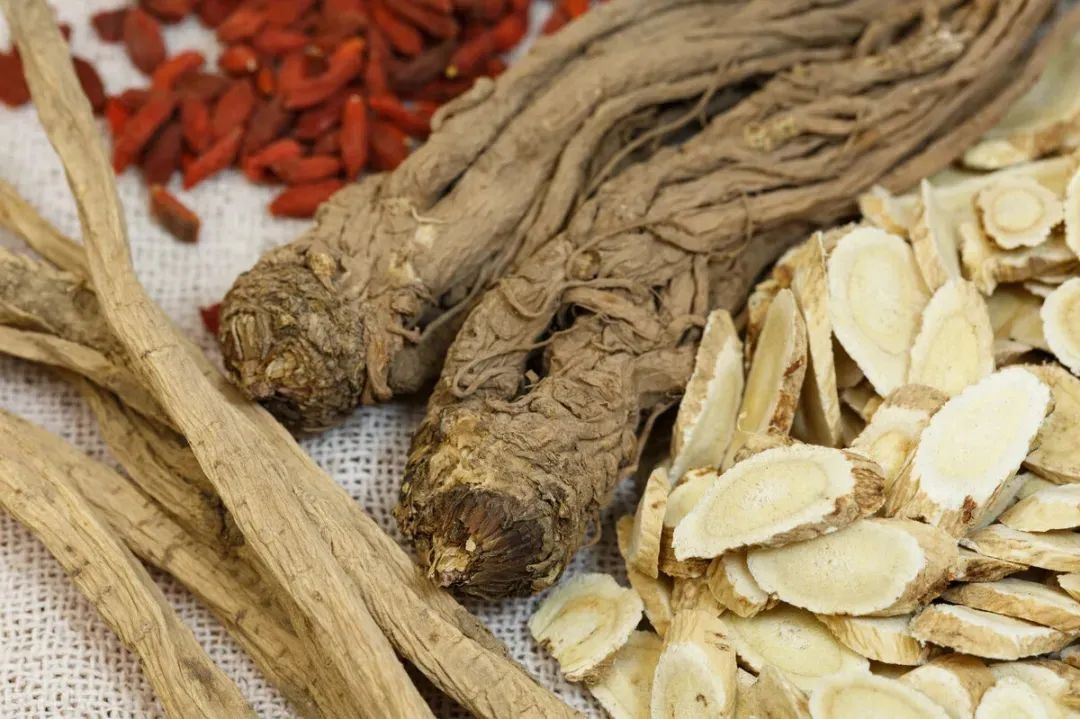
Summary of Dang Shen’s Functions:
1. Strengthening the Spleen and Stomach:
Dang Shen can strengthen the Spleen and Stomach. If the Spleen and Stomach are weak, it can lead to poor appetite and fatigue. Although these are not serious issues, they pose a significant threat to health. Consuming Dang Shen can enhance Spleen and Stomach function, improving appetite and promoting recovery. When taking Dang Shen, it can be combined with Licorice (Glycyrrhiza uralensis), Chinese Yam (Dioscorea opposita), and Lotus Seed (Nelumbo nucifera).
2. Nourishing Blood and Benefiting Qi:
In Traditional Chinese Medicine, a person’s health is primarily assessed by their Qi and blood. If both Qi and blood are deficient, symptoms such as shortness of breath, pale tongue, and pallor may appear. Dang Shen has the effect of nourishing blood and benefiting Qi, and can be cooked with Fu Ling (Poria cocos), Angelica (Angelica sinensis), and White Peony (Paeonia lactiflora) to make a soup that nourishes blood and Qi. Combining Dang Shen with Sheng Di (Rehmannia glutinosa) and Angelica can also treat anemia.
3. Treating Qi Deficiency Cough and Wheezing:
The lungs govern Qi, and if they are deficient, it can lead to scattered Qi in the body, resulting in wheezing and susceptibility to colds. Dang Shen can tonify Qi and is effective in treating Qi deficiency cough and wheezing. Combining Dang Shen with Dry Ginger (Zingiber officinale), Licorice, and Schisandra (Schisandra chinensis) can treat Qi deficiency cough and wheezing.
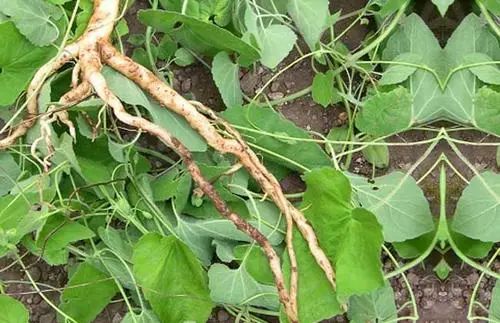
Precautions for Consuming Dang Shen:
Dang Shen primarily functions to tonify Qi and blood, and is a nourishing herb. Generally, consuming Dang Shen does not have side effects, but it is important not to take it in excessive amounts frequently, as this may lead to excessive Qi tonification, which can be detrimental to the body’s positive Qi, resulting in symptoms of dryness and heat. Therefore, it is crucial to avoid excessive consumption of Dang Shen.
【Consumption Precautions】
1. Dang Shen should not be cooked with cool foods such as fish, turtles, and duck, as it is a warming herb.
2. Dang Shen should not be consumed with radishes.
This is because the effects of the two foods are opposite; the former is a Qi tonifying herb, while the latter has the effect of moving Qi, making them unsuitable to consume together.
3. Dang Shen should not be consumed with Rhubarb (Rheum palmatum), as this may lead to poisoning due to a reaction between their active components.
4. Dang Shen should not be taken with strong tea,
as the tannins in strong tea can react with the alkaloids and heavy metal salts in Dang Shen, forming insoluble precipitates that affect the absorption of the herb and harm the gastrointestinal tract.
【Dang Shen Medicinal Dishes】
1. Angelica, Red Date, and Dang Shen Chicken Soup
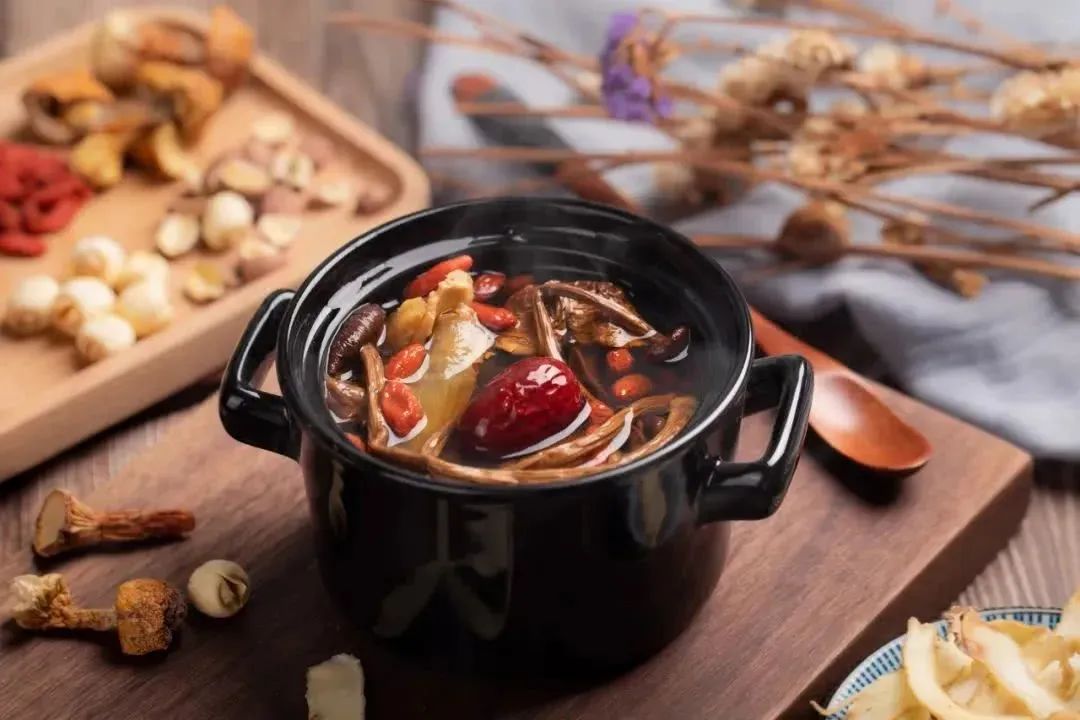
Ingredients: Angelica, Dang Shen, Red Dates, Goji Berries, and a whole chicken. Preparation steps:
1. Prepare Angelica, Dang Shen, Red Dates, and Goji Berries, and clean the chicken.
2. In a clean clay pot, place the chicken, scallions, ginger, and cooking wine, adding water to the maximum level.
3. Bring to a boil over high heat, skim off the foam, add Angelica, Dang Shen, and Red Dates, cover, and simmer on low heat for 1 hour. Add Goji Berries and salt to taste, and cook for another 3 minutes before serving. A small bowl daily is recommended, but do not overconsume.
Effect: This soup can strengthen the Spleen, tonify the Lungs, nourish blood and Qi, promote health, and calm the mind, suitable for consumption during times of irritability and restlessness.
2. Carp and Dang Shen Soup
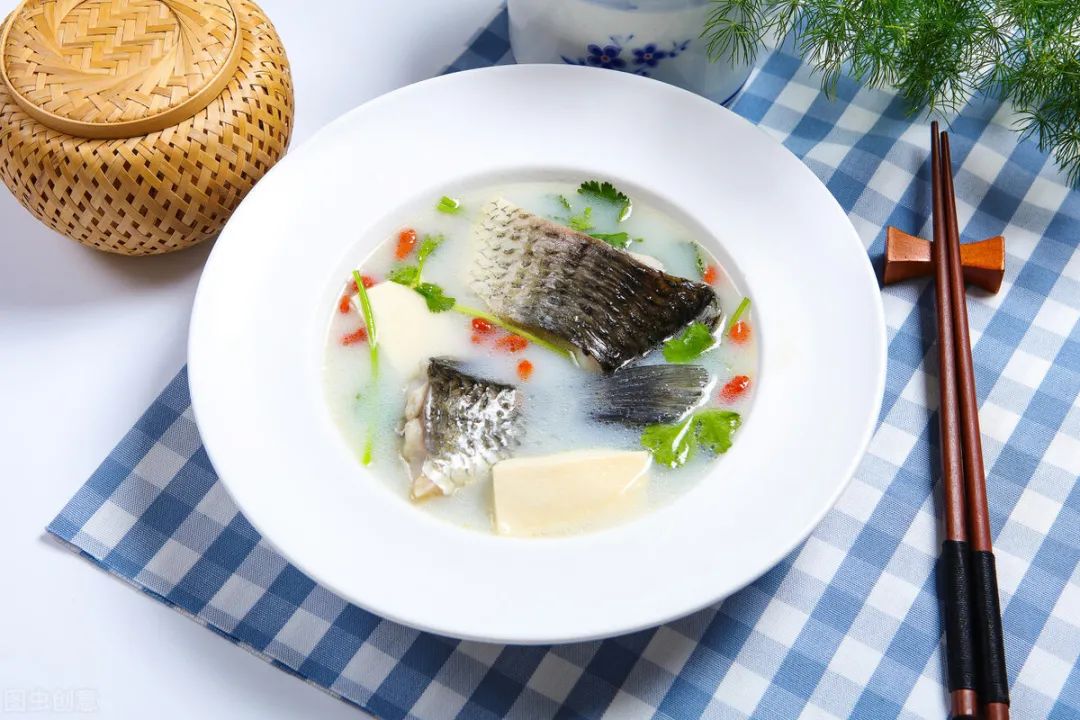
Ingredients: 1 Carp, 4 pieces of Tofu, 30g of Dang Shen, 10g of cooked Ham, and 50g of lean Pork.
Preparation steps:
1. Clean the Carp, drain, and fry in oil; slice the lean pork.
2. Use meat broth to boil the pork slices, ham, and Dang Shen, then add the Carp and Tofu. Bring to a boil over high heat, then simmer for 20 minutes on low heat, seasoning with salt, MSG, and cilantro.
Effect: This dish can benefit Qi, strengthen the Spleen, promote diuresis, and reduce swelling, suitable for those with kidney Yang deficiency and edema. It is also very suitable for women during their menstrual period.

Clinical Applications

1. Used for weakness caused by various reasons:
Especially for weakness due to Spleen and Stomach deficiency, low digestive absorption function, sinking Qi, and spontaneous sweating. It is often combined with Bai Zhu (Atractylodes macrocephala), Fu Ling, Huai Shan Yao (Dioscorea opposita), and Lotus Seed, with formulas such as Shen Ling Bai Zhu San (Ginseng and Atractylodes Powder) and Si Jun Zi Tang (Four Gentlemen Decoction). The Four Gentlemen Decoction is a fundamental formula for treating Spleen and Stomach deficiency, and any condition caused by Spleen deficiency can be treated by adjusting this base formula.
2. Used for iron deficiency and malnutrition anemia:
Especially for anemia caused by Spleen and Stomach deficiency and impaired digestive absorption, as well as for conditions like Wasting and Thirsting Syndrome, often combined with Dan Gui (Angelica sinensis), Bai Shao (White Peony), and Shu Di Huang (Rehmannia glutinosa), with formulas like Bai He Guo Tang (Blood Nourishing Decoction). Clinical experience shows that Dang Shen has a good blood-nourishing effect.
3. Used for chronic cough with Lung deficiency symptoms:
Especially effective for mild toxic symptoms of pulmonary tuberculosis, utilizing its phlegm-relieving and cough-suppressing properties, often combined with Zi Wan (Aster tataricus), Wu Wei Zi (Schisandra chinensis), and Ejiao (Donkey-hide gelatin). Additionally, Dang Shen can be used for nephritis, reducing urinary protein excretion.
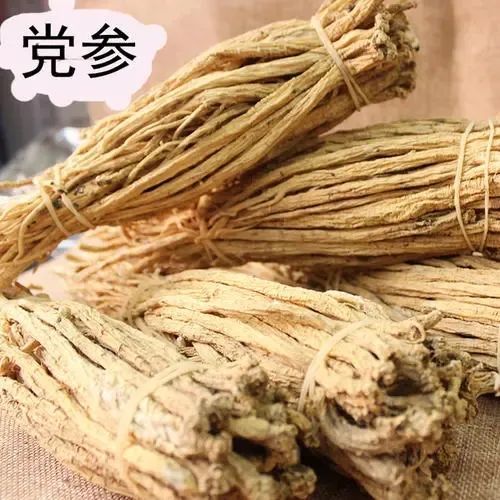
Consumption Notes

1. Do not consume Dang Shen with radishes;
2. Do not consume in large amounts for extended periods;
3. When consuming Dang Shen, consider the individual’s constitution. Dang Shen can effectively tonify Qi and dispel dampness, suitable for those with Qi deficiency and Spleen dampness, while those with a solid physique and thin body should avoid it.

Properties: Sweet, Neutral. Associated with the Spleen and Lung meridians.
Main Functions and Indications:
Strengthening the Spleen and benefiting the Lungs, nourishing blood and generating fluids. Indicated for Spleen and Lung Qi deficiency, poor appetite, fatigue, weak cough, insufficient Qi and blood, pale complexion, palpitations, shortness of breath, damage to both Qi and fluids, shortness of breath and thirst, and internal heat thirst.
Dosage: Decoction, 9-30g.
Usage Precautions: Not suitable for use with Rhubarb.
Modern Pharmacology: The decoction of Dang Shen can regulate gastrointestinal motility and has anti-ulcer effects. The decoction can stimulate the release of gastrin. Dang Shen saponins can inhibit gastric acid secretion and protect the gastric mucosa. Dang Shen polysaccharides can promote the growth of Bifidobacterium, regulate the imbalance of intestinal flora, and increase peripheral blood hemoglobin, enhancing the compensatory hematopoietic function of the spleen, and improving leukopenia caused by chemotherapy and radiotherapy. Additionally, Dang Shen has effects of enhancing immunity, dilating blood vessels, lowering blood pressure, and improving microcirculation.
Selected Formulas:
1. Emergency treatment for collapse: Generally, Ren Shen (Ginseng) is used (in Du Shen Tang), but if Ginseng is not available, 50-150g of Dang Shen, 10-15g of Fu Zi (Aconitum carmichaelii), and 25-50g of Bai Zhu can be used for emergency decoction, serving as a substitute for Du Shen Tang.
2. Insufficient Qi and organ prolapse: 15g each of Dang Shen and Huang Qi (Astragalus membranaceus), 9g of Bai Zhu, and 5g of Sheng Ma (Cimicifuga foetida). Decoction, 1 dose daily.
3. Primary hypotension:
6g of Dang Shen, 6g of Huang Qi, and 3g each of Wu Wei Zi, Mai Dong (Ophiopogon japonicus), and Cinnamon. Grind into powder and take 6g each time, 3 times a day, for 30 days.
Dietary Therapy:
Dang Shen and Red Date Tea: Strengthens the Spleen and Stomach, benefits Qi and generates fluids. 5g of Dang Shen, 4-5 Red Dates, and 2g of tea leaves. Wash Dang Shen and Red Dates, then steep with boiling water for 5 minutes before drinking.
Dang Shen Tea: Strengthens the stomach, dispels phlegm, benefits Qi, and nourishes blood. 5g of honey-roasted Dang Shen and 10-15g of black tea, mixed and steeped in boiling water for 5 minutes, served warm.
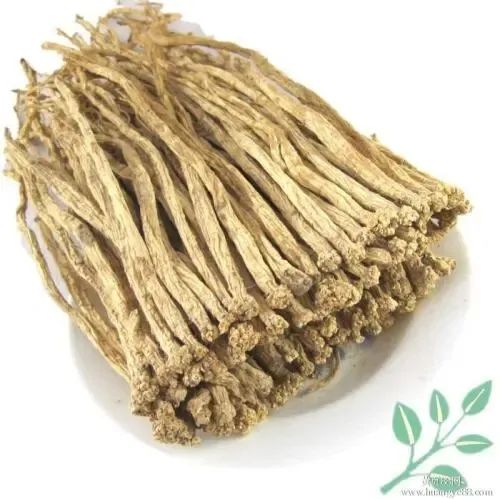 Combination and Pairing
Combination and Pairing
1. Dang Shen + Huang Qi:
Tonifying Middle Qi, Enhancing Immunity
Dosage: 10g each of Dang Shen and Huang Qi, decocted or steeped in hot water as a tea.
Suitable for: Those with insufficient Middle Qi, weak cough, shortness of breath, easy fatigue, and low immunity.
Service Dialogue:
Dang Shen and Huang Qi tonify Spleen and Lung Qi, working together to enhance Middle Qi and elevate Yang Qi, ensuring sufficient Middle Qi.
2. Dang Shen + Lotus Seed: Regulating the Spleen and Stomach
Dosage:
10g of Dang Shen and 10g of Lotus Seed, decocted, eat the Lotus Seeds, and drink the soup, or steep in hot water repeatedly as a tea.
Suitable for: Those with stomach issues, poor digestion, chronic diarrhea, or loose stools.
Service Dialogue:
Dang Shen tonifies Spleen and Lung Qi, while Lotus Seed strengthens the Spleen and stops diarrhea, working together to tonify Qi and stop diarrhea, strengthening the Spleen and Stomach.
3. Dang Shen + Angelica: Activating Blood and Nourishing Liver Blood
Dosage: 10g of Dang Shen and 5g of Angelica, decocted or steeped in hot water as a tea.
Suitable for: Those with blood stasis constitution, cardiovascular diseases, irregular menstruation, dizziness, and insomnia with vivid dreams.
Service Dialogue:
Dang Shen tonifies Qi and nourishes blood, while Angelica nourishes blood and activates circulation, working together to effectively treat deficiency of both Qi and blood.
4. Dang Shen + Longan: Supplementing Both Qi and Blood, Nourishing Heart Blood
Dosage: 10g of Dang Shen and 8 Longan, steeped in hot water as a tea.
Suitable for:
Those with insufficient heart blood, shallow sleep, fatigue, spontaneous sweating, elderly and weak individuals, and those with chronic illnesses.
Service Dialogue:
Dang Shen tonifies Qi and nourishes blood, while Longan nourishes the heart and Spleen, calming the mind, working together to supplement both Qi and blood.
5. Dang Shen + Mai Dong + Wu Wei Zi:
Benefiting Qi, Nourishing Yin, Generating Fluids
Dosage: 9g of Dang Shen, 9g of Mai Dong, and 6g of Wu Wei Zi, decocted.
Suitable for: Those who sweat easily, have weak limbs, poor spirit, dizziness, chest tightness, shortness of breath, dry mouth and throat, and poor appetite.
Service Dialogue:
Dang Shen tonifies Spleen and Lung Qi, Mai Dong nourishes Yin and clears heat, while Wu Wei Zi restrains Yin and stops sweating. Together, they benefit Qi, nourish Yin, moisten the lungs, stop cough, and generate fluids to quench thirst.
6. Dang Shen + Red Dates: Nourishing the Lungs and Strengthening the Spleen, Benefiting Qi and Nourishing Blood
Dosage: 10g of Dang Shen and 4 Red Dates, steeped in hot water as a tea.
Suitable for: Those with fatigue, weakness, and drowsiness due to Spleen and Lung Qi deficiency.
Service Dialogue:
Dang Shen tonifies Spleen and Lung Qi, while Red Dates nourish blood, working together to tonify Qi and blood, ensuring abundant Qi and blood, alleviating various symptoms.
